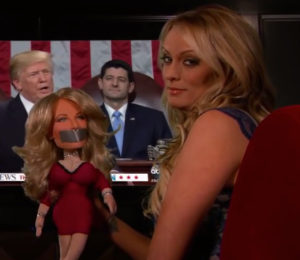There’s not much that can prepare you for a Yewtree police raid so, when it happens, your best bet is to bring in the professionals. Cliff Richard hired crisis management experts to help prepare him for his first post-raid interviews in 2014 – but he appears to have forgotten some of their sensible advice in the years since. So maybe a little refresher is in order?
Wired For Soundbites
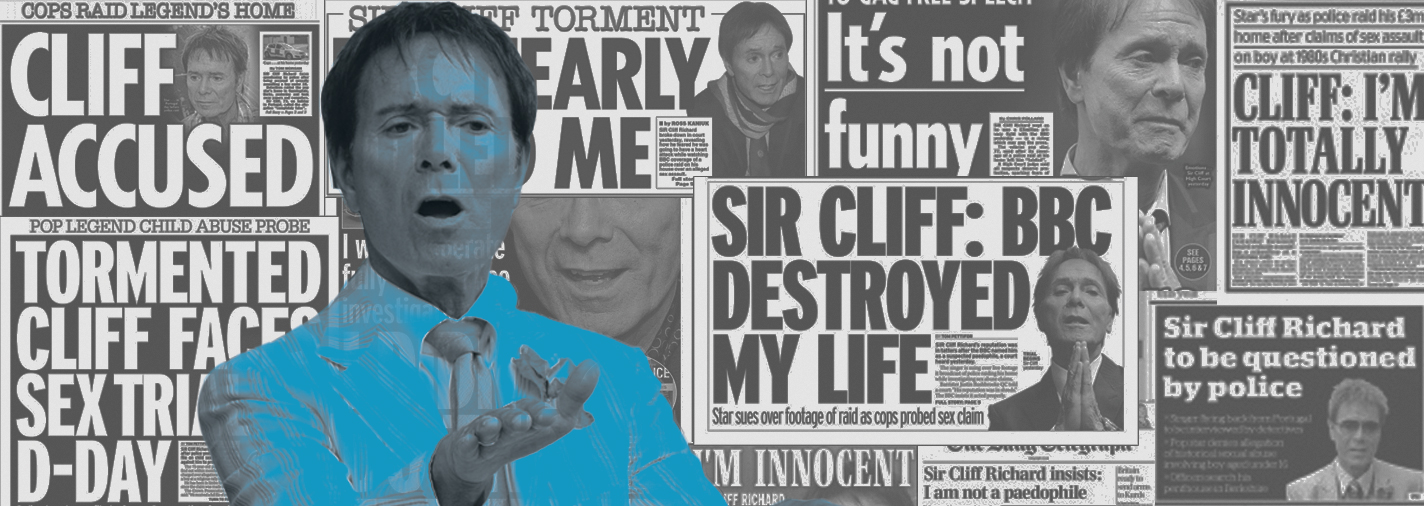

In 2014, shortly after the televised raid of his home, Sir Cliff Richard sat down in a fake TV studio – filled with dummy lighting, dummy cameras and a dummy host – in order to give a fake TV interview. Under the watchful eye of well-paid crisis management experts, Cliff Richard proceeded to answer a series of unbroadcast, on-camera questions in order to test himself out.
His wording, his messaging, his demeanour were then pored over by media analysts, who gave extensive and detailed feedback on his performance so that he could study up, rehearse and prepare for the real thing.
How do we know this?
First of all, we know because it would have been deeply unusual if he hadn’t. It’s actually fairly standard practice for someone of Cliff Richard’s stature to consult PR professionals before talking to the press in this sort of situation – and rigorous media training is an essential part of that service to ensure their subject holds up under scrutiny in the studio.
Second of all, we know because the company that Cliff Richard brought in to help (Phil Hall Associates) has been banging its drum quite publicly about all the expert assistance it has offered him over the last four years.
Thirdly (and, to our minds, most convincingly) we know because we’ve seen the feedback document they gave him ourselves.
The document makes for interesting reading – shedding light on both a celebrity’s raw instincts when questioned about something as grave as a police raid; and on the candid type of advice that is given behind-the-scenes.
The fruit of all of this labour is due to be broadcast on ITV this coming Monday, in a Sir Cliff special entitled Cliff Richard: 60 Years In Public And in Private.
As such, we thought the time was right for us to guide you through some of the more notable passages in that feedback document. In part, so that you can see for yourself the scale of orchestration that happens ahead of these highly anticipated interviews. But also because, from the interviews that he’s been giving recently, and the quotes that have been appearing in the subsequent newspaper coverage, it seems like he’s forgotten most of the stuff he was once told by those expensive experts.
You only need to look at the weekend’s big stories to see that these are the sorts of headlines you usually pay tens of thousands of pounds to avoid – not generate.
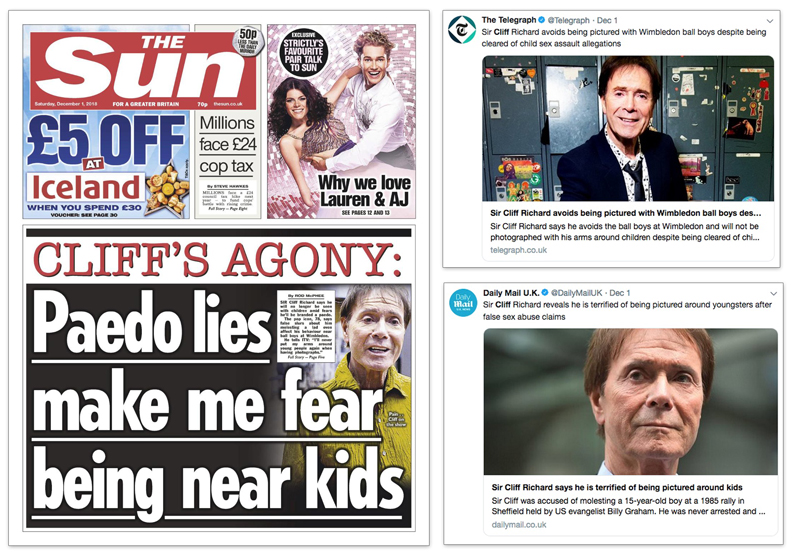
So it might be in Cliff’s best interests if we recap the lessons they laid out in 2014 to remind him what he’s supposed to be saying – and what he’s supposed to not be saying…

Internet Rumours
One of the things that the interview feedback document makes abundantly clear is that Cliff Richard is one of the world’s most prolific vanity searchers.
Reading between the lines of their advice, it is obvious that Sir Cliff has spent a huge chunk of his leisure time Googling his own name, as he is completely up to speed on the more outlandish internet rumours regarding him – even the ones in the darkest, sparsest corners of the web.
During his dry-run attempt at a TV tell-all interview, he couldn’t stop himself from bringing up the topic of online conspiracy theories.
Two of the quotes that Cliff offered the dummy interviewer in his first unbroadcast interview were:
– “They even say I’ve got children buried in my vineyard,”
and
– “That anyone could think I murdered Jill Dando is beyond me”
Unsurprisingly, his handlers were keen to impress upon Cliff that inadvertently implicating himself in the death of Jill Dando (however lightly; however tangentially) would not be a particularly helpful thing to bring up – especially when trying to assert his innocence in an totally unrelated matter.
To offer our perfectly objective two cents on it, we have to say we agree with that assessment. But we can see why Cliff would want to address it.
To Cliff, all of these stories are connected. They are all unfair, untrue, unhinged fantasies that were stirred up by cranks on the internet, propagated to damage his wholesome Christian reputation. It’s perfectly fair for him to feel aggrieved by them and you can see the logic in him trying to use the interview as an opportunity to clear the air about every last lie that’s ever been told about him.
What Cliff was forgetting though is that he is actually one of very few people who would be aware of any these stories – much less all of them.
As much as it might pain him to hear, there really aren’t that many people who spend their evenings and weekends scrolling through blogs looking for outlandish Cliff Richard stories. Yes, there is a handful of kooky people who believe (for example) that Madeline McCann is dead and buried in Cliff’s Portuguese estate – but using his first television interview after a high-profile police raid to draw attention to that conspiracy is probably not the best use of the platform.
Nor is telling everyone about the website he’d found somewhere on the internet where (and this is a genuine, verbatim quote from the unbroadcast rushes): “A picture comes up of me, with dreadful music playing, and it says ‘Cliff Richard, Paedophile’.”
(We’ve yet to find it, alas…)
 Mind Your Language
Mind Your Language
Another major concern from Cliff’s team was that he was could perhaps be a little unguarded with his choice of phrasing.
In fact, they dedicated an entire section of the document to ‘Use Of Language Relating To Child Pornography’ – in which they detail a number of moments throughout Cliff’s mock interview where he made statements that could do his public image some unintended harm.
For example, at one point, Cliff told his dummy interviewer “There is no child porn in my life” – a phrase that his handlers were rightly cautious of, fearing that the press would zone in on it and splash it as a quote across the front pages.
Again, this is eminently sensible advice. When Freddie Starr was first collared by Yewtree, he went off half-cocked, giving a statement to camera about how he couldn’t possibly have been hanging out with Jimmy Savile and Gary Glitter because paedophiles have always been a “pet hate” of his.
“Paedophiles Are My Pet Hate!” went on to become the defining quote of his case.
It’s no bad thing to get yourself on record as being anti-paedophile, of course, but phrasing it in such a way doesn’t make you look particularly serious. It’s also not helpful to have your name closely associated with an act or behaviour that you’re trying to strenuously deny (which is why vague, neutral phrases like “all charges” or “any wrongdoing” are always so popular in prepared statements).
Dave Lee Travis tried to work things from the other angle, adopting a conscious sangfroid about the proceedings – when he said: “I’ve been talking to the police about sexual… I can’t even remember what the word is now. In the old days it was called ‘putting your arm around somebody and giving them a cuddle’ but nowadays god knows. But anyway, I was accused of squeezing the boobs of a couple of women.”
Having seen the shitstorm those comments whipped up, with hindsight, DLT might have chosen to express himself (and the nature of his charges) a little more carefully.
Cliff, on the other hand, managed to avoid getting wrapped up in a similar situation in 2014. That’s because he gave most of his poorly-phrased, cavalier descriptions of the accusations* to a fake camera first.
(* “I can’t repeat it. It’s a semi-pornographic description of what I’m supposed to have done. It’s not sodomy or anything like that – but the whole thing was offensive”)
With Friends Like These…
Drafting in a celebrity supporter is a bit of a mixed bag in these sorts of situations.
Back when he was up in the dock, Max Clifford absolutely tanked the credibility of Pauline Quirke by asking her to take the stand and speak up in defence of his character – shortly before he was sent to prison for eight years for the indecent assault of four women and girls.
On the other hand, Paul Chuckle from the Chuckle Brothers was instrumental in securing a conviction in the Dave Lee Travis case when Paul gave evidence in court saying that he interrupted an assault by walking in on DLT in a dressing room. In doing so, he helped to secure justice for the Hairy Cornflake’s victims.
So there are advantages and drawbacks of it.
Quite what bearing Gloria Hunniford had on Cliff Richard’s particular case, we aren’t really sure – but, for what it’s worth, one of the very few things that his PR people seemed absolutely fine with in his mock interview in 2014 was his continued name-dropping of her.
Which is lucky because now, in 2018, you can barely move for her in the Cliff coverage.
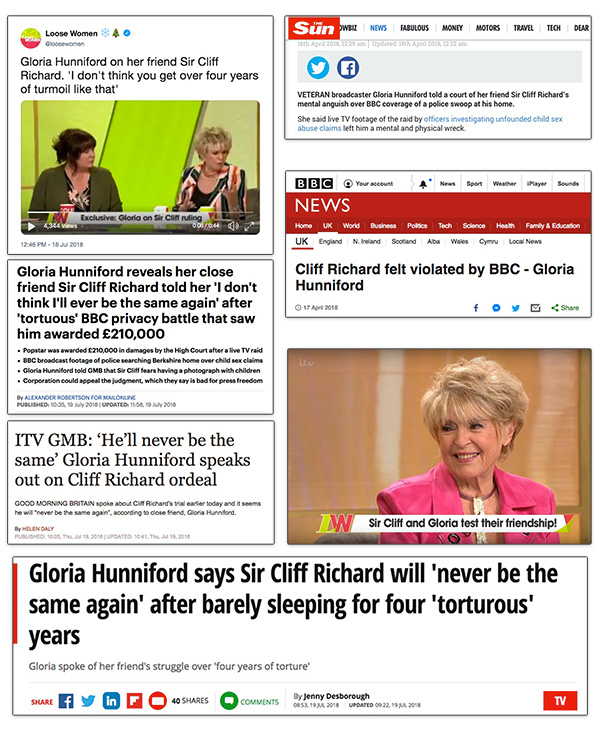
Private Matters
There is a temptation, when your privacy has been invaded once, to feel that every aspect of your life is now public domain and that you have nothing left to lose. However, extreme candour in these situations is not always helpful – nor is it necessary.
For example, after years of being known as a reserved, wholesome and non-scatological celebrity, Cliff somehow decided that descriptions and details about his pissing regime would make for a solid talking point.
During an answer he gave about the alleged assaults – which were supposed to have happened when he nipped away from sight for a while at a Billy Graham event in Sheffield – Cliff explained that there’s no way they could have happened as described because of his exceptionally strong bladder.
The exact quote he gave in the fake interview, if you’re interested, was: “I don’t even need to go to the toilet because my bladder is really good. I go before I arrive and I don’t have to go until after it’s all over.”
His people suggested that “It is best to avoid mentioning bladder or any other inherently private issue” – presumably worried that it might open some unhelpful floodgates.
As it were.
Big Up Yourself
Another important lesson that his handlers were keen to impress upon him in this document was to not let his ego flare up. No-one likes to see a star pull the “Don’t you know who I am?” card at the best of times, but it could be career-ending to do it when allegations of wrongdoing are circling.
Yet, despite the gravity of the situation, Cliff still wasn’t immune from blowing his own trumpet in his mock interview, something which his advisors were very quick to bat down.
They suggested that for Cliff to continually position himself as “one of the biggest names in Britain” and “probably THE most recognisable person in Britain” (emphasis theirs) might not make him seem hugely sympathetic – however true the sentiment might have been. Especially when, in contrast, he was busy calling the police “bland” and “unintelligent”.
Now that he has been exonerated, this is one area in which he might be able to play a little more fast and loose with their advice – but he still ought to be careful. The press don’t really tend to do too well with nuance, and will often take a bad-faith reading of a quote wherever possible.
Which is one thing he seems to be coming unstuck with at the minute.
The Young Ones
If you’ve seen any coverage of Cliff in the last week, you’ll maybe have noticed that a lot of the headlines have made a big deal of the fact that he won’t be photographed around young people any more.
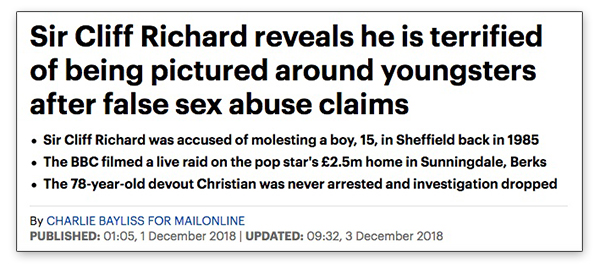
When he underwent these preliminary interviews, his PR team warned him about this. They told him to be careful not to make any sweeping generalisations about children as a whole – as children, generally, are quite well thought of and coming out as anti-child (like children are the problem) wouldn’t endear him to many.
They also foresaw that it would set up a rather unhelpful segue for reporters, who would then go on to explain exactly why he would have a fear of being photographed near children, repeating the unfounded accusations that were once levelled at him.

These little nuggets of wisdom have clearly slipped Cliff’s mind, as this is not the first time he’s fallen into this trap. A number of stories have appeared about his reluctance to be near kids, all thanks to this talking point, and it is always exactly the angle the press chooses to focus on.
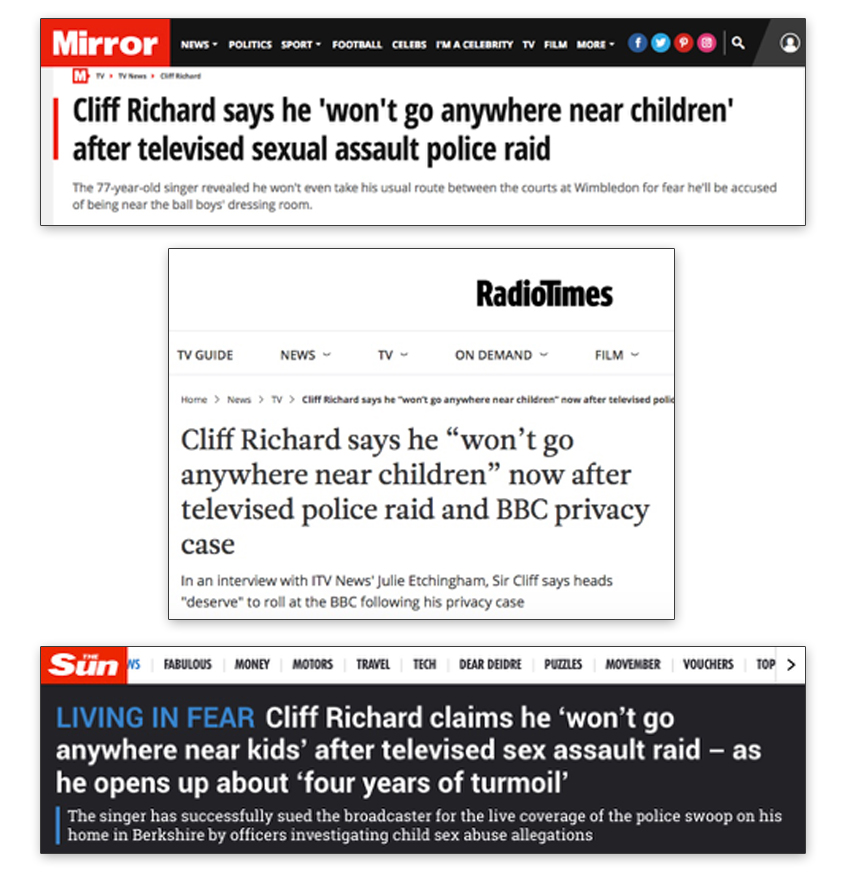
Some with added extra Hunniford…

Obviously it goes without saying that we wish Cliff all the best for Monday. He’s been through hell and back and deserves to tell his side of the story, fairly and without too much sensation. We hope that all the training has been worth it, that Phil Hall Associates get a glowing testimonial for their services and that the press show a little more restraint and responsibility when reporting on him than they have shown in the past.
We’re rooting for you, Cliff.
(And if you want to drop us a private line to tell us where we can find that “Cliff Richard, Paedophile” website, well, we’d really appreciate it…)



